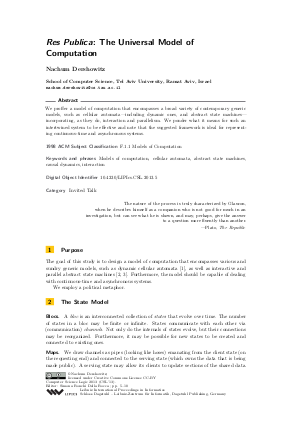Res Publica: The Universal Model of Computation (Invited Talk)
Author Nachum Dershowitz
-
Part of:
Volume:
Computer Science Logic 2013 (CSL 2013)
Part of: Series: Leibniz International Proceedings in Informatics (LIPIcs)
Part of: Conference: Computer Science Logic (CSL) - License:
 Creative Commons Attribution 3.0 Unported license
Creative Commons Attribution 3.0 Unported license
- Publication Date: 2013-09-02
File

PDF
LIPIcs.CSL.2013.5.pdf
- Filesize: 374 kB
- 6 pages
Document Identifiers
Subject Classification
Keywords
- Models of computation
- cellular automata
- abstract state machines
- causal dynamics
- interaction
Metrics
- Access Statistics
-
Total Accesses (updated on a weekly basis)
0PDF Downloads0Metadata Views
Abstract
We proffer a model of computation that encompasses a broad variety of contemporary generic models, such as cellular automata---including dynamic ones, and abstract state machines---incorporating, as they do, interaction and parallelism. We ponder what it means for such an intertwined system to be effective and note that the suggested framework is ideal for representing continuous-time and asynchronous systems.
Cite As Get BibTex
Nachum Dershowitz. Res Publica: The Universal Model of Computation (Invited Talk). In Computer Science Logic 2013 (CSL 2013). Leibniz International Proceedings in Informatics (LIPIcs), Volume 23, pp. 5-10, Schloss Dagstuhl – Leibniz-Zentrum für Informatik (2013)
https://doi.org/10.4230/LIPIcs.CSL.2013.5
BibTex
@InProceedings{dershowitz:LIPIcs.CSL.2013.5,
author = {Dershowitz, Nachum},
title = {{Res Publica: The Universal Model of Computation}},
booktitle = {Computer Science Logic 2013 (CSL 2013)},
pages = {5--10},
series = {Leibniz International Proceedings in Informatics (LIPIcs)},
ISBN = {978-3-939897-60-6},
ISSN = {1868-8969},
year = {2013},
volume = {23},
editor = {Ronchi Della Rocca, Simona},
publisher = {Schloss Dagstuhl -- Leibniz-Zentrum f{\"u}r Informatik},
address = {Dagstuhl, Germany},
URL = {https://drops.dagstuhl.de/entities/document/10.4230/LIPIcs.CSL.2013.5},
URN = {urn:nbn:de:0030-drops-41844},
doi = {10.4230/LIPIcs.CSL.2013.5},
annote = {Keywords: Models of computation, cellular automata, abstract state machines, causal dynamics, interaction}
}
